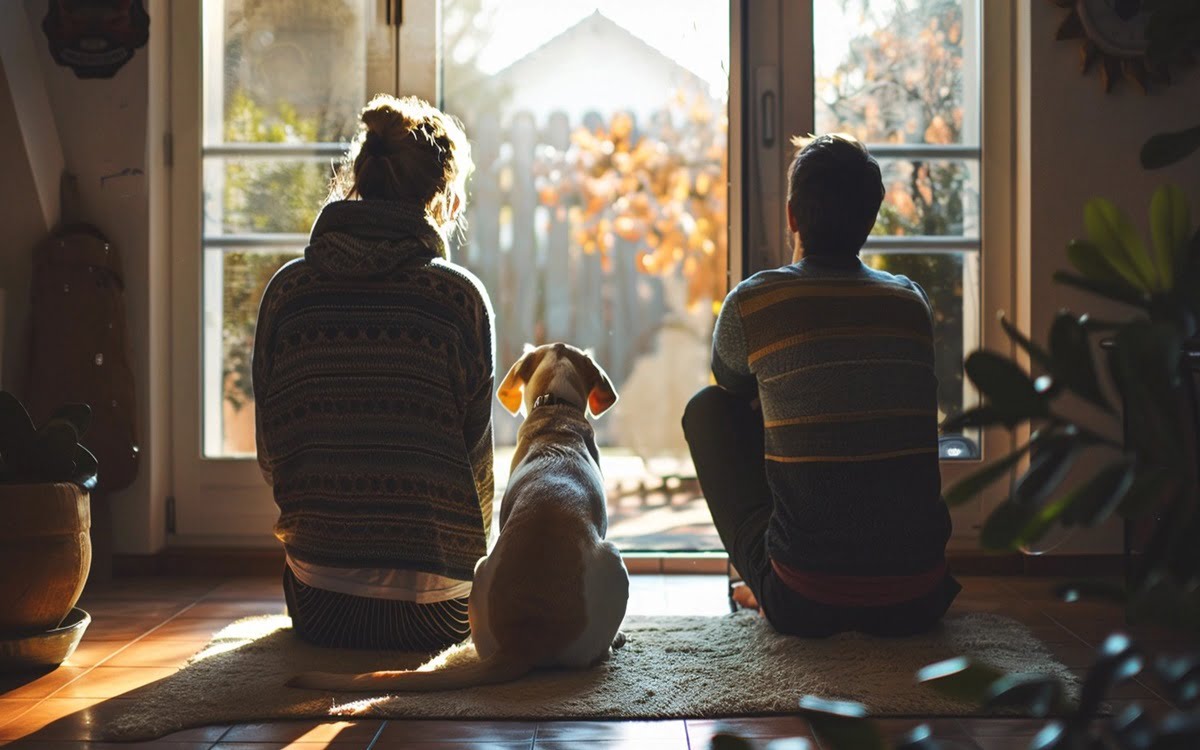Dogs might not talk our language, but they sure have a lot to say! They use their bodies, barks, whines, and yes, even door-sitting, to communicate how they are feeling. Think of it like your dog’s version of sending a text message. Maybe it’s a simple, “gotta pee!” or a more complex, “I’m feeling anxious, please make this exciting thing happen right now!”
The Door: A Portal to Possibility
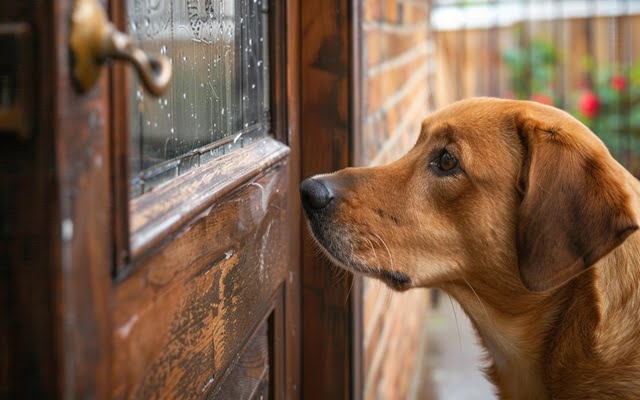
For your dog, the door is a magical gateway. It’s where walks happen, where you appear after being gone, where all the best smells come from. It makes sense that they’d park themselves there, hoping something good is about to happen!
FOMO: Fear of Missing Out
Dogs can be total FOMO sufferers. They see you getting your shoes and suddenly, their mission is to NOT miss out on the fun. And who can blame them after being home alone, maybe bored, while you do all that exciting human stuff?
Is it Excitement or Anxiety?
Sometimes, what looks like happy anticipation (tail wagging, pacing) is actually a bit of rising anxiety. Maybe your dog is worried you won’t come back, or maybe they struggle with too much excitement. Sitting in front of the door may be their way of trying to speed up the process. You can also train your dog through many useful dog training apps Woofz or hire a dog trainer to help the dog understand you better and bond with its owner.
“Nature Calls”: Decoding Potty Signals
Let’s face it, sometimes the answer is as simple as your dog telling you, “Hey human, I gotta go!” But pups don’t exactly send calendar invites for potty breaks. Here’s how to crack their code:
- The Whine & Sniff Combo:Is your dog whining and sniffing around the door? That’s a pretty good sign they’re feeling the urge.
- Pacing Patrol:Are they pacing back and forth near the door, restless and unable to settle? Could be they’re trying to hold it but are getting desperate.
- The “I Did a Thing” Celebration:Did your dog just go potty and is now waiting by the door with a super proud grin? They might be expecting a treat or praise – be consistent with potty rewards!
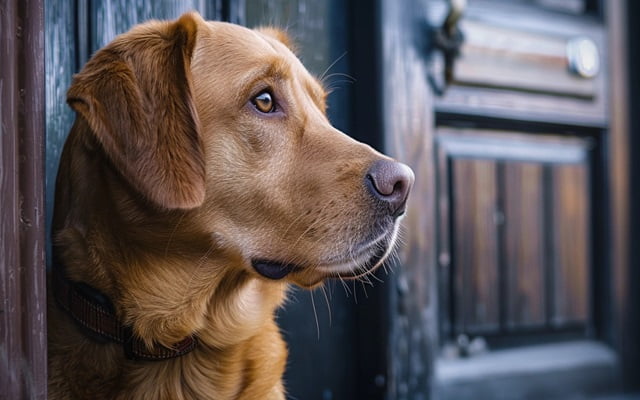
Battling Boredom: Mind Games for Your Pup
If your dog has all the potty breaks they need and still won’t leave the door, boredom might be the culprit. Time to bust out some brain games!
- Puzzle Power: Invest in a few puzzle feeders or hide treats around the house. Making your dog work for their food is mentally stimulating and super satisfying!
- Sniffing Safari: Sprinkle your dog’s kibble in the grass before a walk, or hide it inside a towel and let them sniff it out. Nose work is tiring in the best way!
- DIY Fun: Old cardboard boxes, newspaper, and empty yogurt containers can transform into amazing boredom-buster toys. Get creative!
Easing Separation Anxiety
If your dog’s door-sitting goes along with whining, barking, or destructive behavior when you’re gone, it could be separation anxiety. Here’s how to start helping them feel more secure:
- Baby Steps: Practice leaving for short periods and gradually increase the time. Start with literally stepping out the door and coming right back.
- Comfy Crate: If crate-trained, make their crate a happy place with treats and cozy blankets. It shouldn’t feel like a punishment, but a safe den.
- Departure Distractions: Leave a super yummy stuffed KONG as you head out the door. This creates a good association with you leaving.
Door-Rushing Madness: Teaching Patience
Got a dog that barrels through the door the second it cracks open? Here’s how to get them to chill:
- The “Sit” Savior:Teach your dog a rock-solid “sit” and “wait” at the door. No door opening unless they can hold the position.
- Reward City:Every time they sit nicely, toss a treat AWAY from the door. This teaches them that waiting calmly gets them good stuff.
- Leash Lessons:Even for potty breaks, have your dog on a leash at the door. This gives you more control and helps prevent accidental escapes.
Medical Mysteries: When It Might Be More Than Just a Door Obsession
Sometimes a change in your dog’s usual behavior, including persistent door-sitting, can be a sign of a health issue. Here’s what to watch for:
- Frequent Gotta-Go’s:If your normally well-potty-trained dog suddenly needs out way more often, a vet check is a good idea. Urinary tract infections or other issues might be the cause.
- Pain Problems:Arthritis or other pain conditions might make your dog reluctant to move far from the door, especially if they associate going outside with discomfort.
- Sudden Changes:Did the door-sitting start abruptly, along with other behavioral shifts? Always best to rule out any underlying medical causes with your vet.
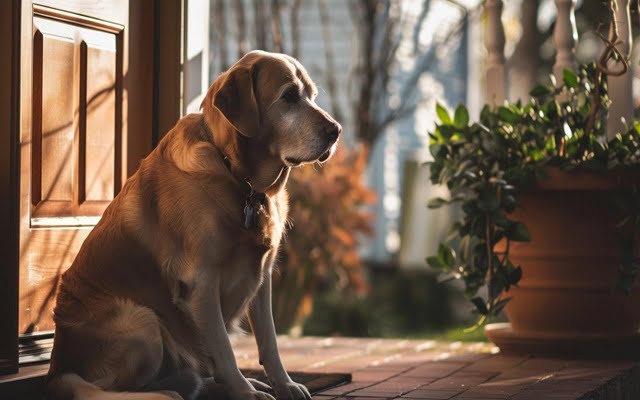
It’s in Their Genes: Breed-Specific Behaviors
While all dogs can be door-sitters, some breeds are more prone to it than others:
- The Guardians:Breeds like German Shepherds or Dobermans were bred for protection. They might see the door as their “territory” to watch over.
- The Hunters:Hounds like Beagles or Terriers have amazing noses and are easily distracted by outdoor smells that beckon them to explore.
- The Herders:Ever seen a Border Collie try to herd its humans? They might view door-sitting as a way to keep track of their “flock.”
Environment Matters: Stressors that Spark Door-Sitting
Is your home environment calm and predictable, or a bit chaotic? Changes and stress can make your dog cling to the door as a source of control or an escape route.
- Loud Noises:Construction, fireworks, or thunderstorms can send a sensitive dog straight to the door, seeking comfort or wanting to get away from the scary sound.
- Routine Shake-Up:Did you move to a new house, have a new baby, or undergo a big schedule change? Dogs thrive on routine, and disruptions can lead to anxiety.
Calling in the Dog Whisperers
Some door-sitting cases are tricky to solve on your own. Here are signs it’s time to consult a certified dog trainer or behaviorist:
- Extreme Anxiety:Does your dog panic, destroy things, or injure themselves when left alone? These go beyond typical door-sitting and need professional help.
- Sudden Onset:If the behavior came on suddenly and is severe, it’s important to rule out medical causes and get personalized behavioral advice.
- No Improvement:If you’ve diligently tried the at-home solutions and see little to no progress, a trainer can create a tailored plan for your pup.
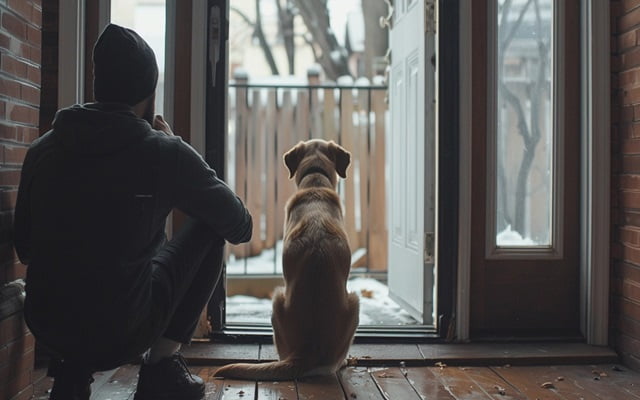
Benefits of Working with a Pro
- Root of the Problem:Trainers are experts at digging into the WHY behind your dog’s behavior, which is key to finding solutions that work.
- Personalized Plan:They’ll address your dog’s specific needs, breed tendencies, and your home environment.
- Success Strategies:A trainer will teach you the right techniques and give you the support you need to make lasting changes.
From Door-Obsessed to Happy Hound
Remember, your dog isn’t trying to drive you crazy by sitting at the door. They’re trying to tell you something! With a little detective work and some patience, you can figure out what that is.
It’s About the Bond
At the end of the day, understanding your dog and helping them feel safe and happy is what matters most. This whole door-sitting adventure might even end up strengthening your bond!
Share Your Stories!
Does your dog have a hilarious door-waiting routine? Did you find a clever way to solve their door-sitting obsession? Share in the comments below! We all learn from each other’s experiences.
A Few Final Thoughts:
- Tailored Solutions:I hope this guide has given you a deeper understanding of dog behavior. Keep in mind that what works for one dog might not work for another, so be open to experimenting and trying different things.
- Professional Resources:Don’t hesitate to search for qualified dog trainers and behaviorists in your area. Sometimes a fresh perspective and hands-on guidance are exactly what’s needed.
- Progress over Perfection:Change takes time, so be patient with your dog.
FAQ
My dog sits at the door even when we just came inside. What gives?
Dogs don’t always understand that “inside” means playtime is over. They might be hoping for another walk, a treat, or just more fun with you!
Is it bad to ignore my dog when they sit by the door?
It depends. Sometimes ignoring is the best way to break the door-sitting habit. But it’s important to understand why your dog is doing it in the first place.
My older dog suddenly started sitting by the door intensely. Could this be a sign of a health issue?
Yes, it’s possible. Sudden behavior changes in older dogs should always be checked out by your veterinarian.

My job is to make sure every fact is right and every article is a joy to read. I’m kind of like a dog trainer for information – I make it behave!

